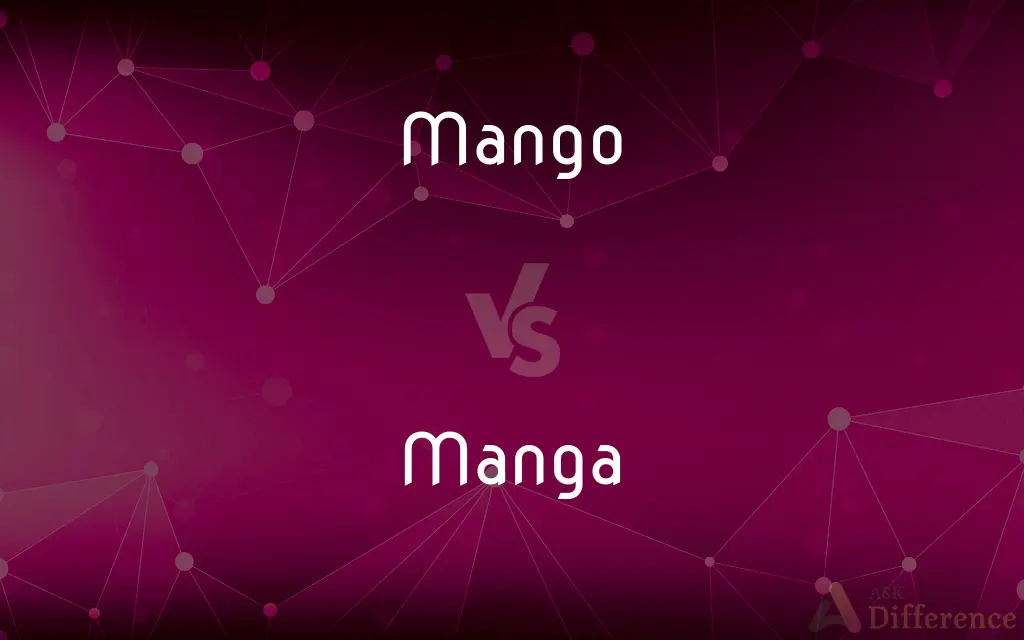Mango vs. Manga — What's the Difference?
By Maham Liaqat & Urooj Arif — Updated on April 1, 2024
Mango is a tropical fruit known for its sweet taste and nutritional benefits, while manga refers to Japanese comic books or graphic novels with diverse themes and art styles.

Difference Between Mango and Manga
Table of Contents
ADVERTISEMENT
Key Differences
Mango, a popular fruit, is celebrated for its sweet flavor and rich nutritional profile, including vitamins, minerals, and antioxidants. It originates from South Asia and is widely cultivated in tropical regions around the world. Manga, on the other hand, is a form of Japanese entertainment and literature, consisting of comics and graphic novels that cover a wide range of genres for various age groups and interests. It has a significant global fanbase and influences international comic and animation industries.
While mangoes are a significant part of culinary cultures, providing flavors to a variety of dishes and beverages, manga plays a crucial role in contemporary pop culture, offering stories that range from historical dramas to futuristic science fiction. Mango cultivation and consumption have environmental and economic impacts, particularly in tropical countries where they are a major agricultural product. Conversely, manga affects cultural expressions and the global entertainment market, with adaptations in movies, video games, and merchandise.
The nutritional value of mangoes makes them beneficial for health, contributing to improved digestion, a healthier immune system, and better eye health. Manga, through its narratives and characters, can offer psychological benefits, such as relaxation, inspiration, and a deeper understanding of Japanese culture and society.
Mango varieties differ in size, color, and taste, depending on the cultivation area and species, whereas manga genres cater to diverse audiences, including children (Kodomo), teenagers (Shōnen for boys and Shōjo for girls), and adults (Seinen for men and Josei for women), each with unique storytelling techniques and themes.
Comparison Chart
Nature
Tropical fruit.
Japanese comics and graphic novels.
ADVERTISEMENT
Origin
South Asia.
Japan.
Role
Nutritional and culinary.
Entertainment and literary.
Impact
Economic and environmental in tropical regions.
Cultural and global entertainment market.
Varieties/Genres
Different sizes, colors, and tastes.
Genres for different age groups and interests.
Benefits
Health benefits like better digestion and immunity.
Psychological benefits and cultural insight.
Compare with Definitions
Mango
Mango is known for its rich, sweet taste and juicy flesh.
He enjoyed a ripe mango as a refreshing summer snack.
Manga
Originating in Japan, manga has a global audience, influencing various cultures.
Manga conventions attract fans from all over the world.
Mango
Varieties of mango can range from green and tangy to orange and sweet.
The Alphonso mango is highly prized for its sweetness.
Manga
Manga encompasses a wide range of genres, from action to romance.
His favorite manga series blends science fiction with adventure.
Mango
Cultivated worldwide, mango plays a key role in many tropical countries' economies.
Mango exports are a significant economic activity in India.
Manga
Manga art styles vary greatly, featuring everything from simplistic to highly detailed illustrations.
The manga’s intricate art style captured her imagination.
Mango
Mangoes are used in culinary dishes worldwide, from salads to desserts.
Mango salsa adds a tropical twist to grilled fish.
Manga
Manga series are often serialized in magazines before being published in volumes.
Fans eagerly await the monthly magazine release for the latest manga chapter.
Mango
Mangoes are a source of vitamins C and A, promoting skin and eye health.
She added mango to her diet for its health benefits.
Manga
Many manga are adapted into anime and movies, expanding their reach.
The popular manga was turned into an anime series, gaining even more fans.
Mango
A mango is an edible stone fruit produced by the tropical tree Mangifera indica which is believed to have originated from the region between northwestern Myanmar, Bangladesh, and northeastern India. M. indica has been cultivated in South and Southeast Asia since ancient times resulting in two distinct types of modern mango cultivars: the "Indian type" and the "Southeast Asian type".
Manga
Manga (Japanese: 漫画 [maŋga]) are comics or graphic novels originating from Japan. Most manga conform to a style developed in Japan in the late 19th century, and the form has a long prehistory in earlier Japanese art.
Mango
The oval fruit of this tree, having a smooth rind, sweet juicy flesh, and a flat one-seeded stone, and eaten ripe or pickled when green.
Manga
A style of Japanese comic books and graphic novels, typically aimed at adults as well as children
Takahashi is an artist who truly represents the very best from the world of manga
Mango
A tropical evergreen tree (Mangifera indica) native to Asia, widely cultivated for its edible fruit.
Manga
A style of comic strip or comic book originally developed in Japan, characterized by stylized colorful art and often adult themes.
Mango
Chiefly North Midland US A bell pepper, especially a green one.
Manga
A comic originating in Japan.
Mango
A tropical Asian fruit tree, Mangifera indica.
Manga
(uncountable) An artistic style heavily used in, and associated with, Japanese comics, and that has also been adopted by a comparatively low number of comics from other countries.
Mango
The fruit of the mango tree.
Manga
A comic in manga style, regardless of the country of origin.
Lately I've been reading a Brazilian manga.
Mango
A pickled vegetable or fruit with a spicy stuffing; a vegetable or fruit which has been mangoed.
Manga
(Christianity) A covering for a crucifix.
Mango
A green bell pepper suitable for pickling.
Mango
A type of muskmelon, Cucumis melo.
Mango
Any of various hummingbirds of the genus Anthracothorax.
Mango
A yellow-orange color, like that of mango flesh.
Mango
(uncommon) To stuff and pickle (a fruit).
Mango
The fruit of the mango tree. It is rather larger than an apple, and of an ovoid shape. Some varieties are fleshy and luscious, and others tough and tasting of turpentine. The green fruit is pickled for market.
Mango
A green muskmelon stuffed and pickled.
Mango
Large evergreen tropical tree cultivated for its large oval smooth-skinned fruit
Mango
Large oval smooth-skinned tropical fruit with juicy aromatic pulp and a large hairy seed
Common Curiosities
How did manga become globally popular?
Manga gained global popularity through its diverse genres, unique storytelling styles, and adaptations into anime and films.
What makes mango unique among fruits?
Mango stands out for its sweet taste, nutritional content, and wide variety of types and flavors.
What distinguishes manga from other comic books?
Manga is distinguished by its Japanese origins, wide range of genres, unique art styles, and storytelling techniques.
Are all mangoes sweet?
While many mangoes are sweet, some varieties are tangy or sour, offering a wide range of flavors.
How does manga reflect Japanese culture?
Manga often incorporates aspects of Japanese culture, society, and historical themes, offering insights into Japanese life and values.
Can mangoes be grown in non-tropical regions?
Mangoes typically require a tropical climate to flourish, though some varieties can be grown in subtropical regions with care.
Why are some manga series adapted into anime?
Popular manga series are often adapted into anime to reach a wider audience and bring the story to life visually.
Is manga suitable for all age groups?
Yes, manga caters to all age groups, with specific genres aimed at children, teenagers, and adults.
What are the health benefits of eating mangoes?
Mangoes are rich in vitamins, minerals, and antioxidants, supporting digestion, immunity, and eye health.
What's the difference between manga and anime?
Manga refers to the comic book or graphic novel format, while anime refers to animated TV shows or movies, often based on manga.
Are there any ecological concerns associated with mango cultivation?
Intensive mango cultivation can lead to water usage concerns and habitat loss in some regions.
How has manga influenced international comic industries?
Manga has influenced international comic industries by introducing new storytelling techniques, genres, and art styles, inspiring creators worldwide.
Can mangoes be used in savory dishes?
Yes, mangoes can be used in savory dishes, such as salsas, salads, and curries, adding a sweet and tangy flavor.
How do environmental conditions affect mango quality?
Climate, soil type, and cultivation practices significantly impact mango size, sweetness, and overall quality.
What role do manga artists play in Japanese pop culture?
Manga artists significantly influence Japanese pop culture, creating iconic characters and stories that resonate with a global audience.
Share Your Discovery

Previous Comparison
Fitter vs. Millwright
Next Comparison
Swapping vs. SwingAuthor Spotlight
Written by
Maham LiaqatCo-written by
Urooj ArifUrooj is a skilled content writer at Ask Difference, known for her exceptional ability to simplify complex topics into engaging and informative content. With a passion for research and a flair for clear, concise writing, she consistently delivers articles that resonate with our diverse audience.
















































